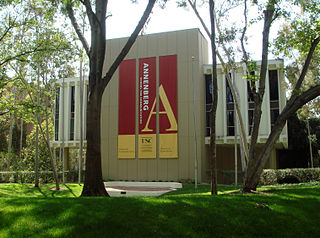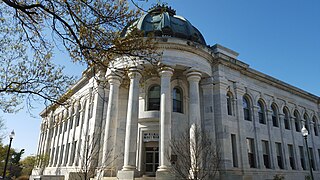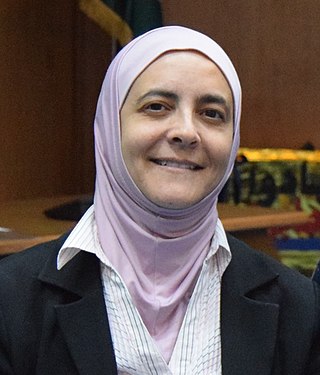Fair use is a doctrine in United States law that permits limited use of copyrighted material without having to first acquire permission from the copyright holder. Fair use is one of the limitations to copyright intended to balance the interests of copyright holders with the public interest in the wider distribution and use of creative works by allowing as a defense to copyright infringement claims certain limited uses that might otherwise be considered infringement. Unlike "fair dealing" rights that exist in most countries that were part of the British Empire in the 20th century, the fair use right is a general exception that applies to all different kinds of uses with all types of works and turns on a flexible proportionality test that examines the purpose of the use, the amount used, and the impact on the market of the original work.

The USC Annenberg School for Communication and Journalism comprises a School of Communication and a School of Journalism at the University of Southern California (USC). Starting July 2017, the school's Dean is Willow Bay, succeeding Ernest J. Wilson III. The graduate program in Communication is consistently ranked first according to the QS World University Rankings.
Kartemquin Films is a four-time Oscar-nominated 501(c)3 non-profit production company located in Chicago, Illinois, that produces a wide range of documentary films. It is the documentary filmmaking home of acclaimed producers such as Gordon Quinn, Steve James, Peter Gilbert, Maria Finitzo, Joanna Rudnick, Bing Liu, Aaron Wickenden, and Ashley O’Shay (Unapologetic).

The School of Communication (SOC) at American University is accredited by the Accrediting Council on Education in Journalism and Mass Communications. The school offers six undergraduate majors: communication studies, journalism, public relations and strategic communication, photography, and communication, language, and culture along with a minor in communication. In addition, interdisciplinary degrees such as communications, law, economics and government, take classes within SOC. SOC offers four graduate programs in film and media arts, public communication, journalism and game design, and a post-graduate program in communication studies. Undergraduates an any major at AU are given the opportunity to complete a combined bachelor's/master's within SOC.
International Documentary Association (IDA), founded in 1982, is a non-profit 501(c)(3) that promotes nonfiction filmmakers, and is dedicated to increasing public awareness for the documentary genre. Their major program areas are: Advocacy, Filmmaker Services, Education, and Public Programs and Events.
The D-Word is an online community for professionals in the documentary film industry. Discussions include creative, business, technical, and social topics related to documentary filmmaking. The name "D-Word" is defined as "industry euphemism for documentary," as in: "We love your film but we don't know how to sell it. It's a d-word." As of 2019 it has over 17,000 members in 130 countries.
Renee Tajima-Peña is an American filmmaker whose work focuses on immigrant communities, race, gender and social justice. Her directing and producing credits include the documentaries Who Killed Vincent Chin?, No Más Bebés, My America...or Honk if You Love Buddha, Calavera Highway, Skate Manzanar, Labor Women and the 5-part docuseries Asian Americans.

Martha Diaz is a Colombian-American community organizer, media producer, archivist, curator, and social entrepreneur.

Thomas Allen Harris is a critically acclaimed, interdisciplinary artist who explores family, identity, and spirituality in a participatory practice. Since 1990, Harris has remixed archives from multiple origins throughout his work, challenging hierarchy within historical narratives through the use of pioneering documentary and research methodologies that center vernacular image and collaboration. He is currently working on a new television show, Family Pictures USA, which takes a radical look at neighborhoods and cities of the United States through the lens of family photographs, collaborative performances, and personal testimony sourced from their communities..
The Center for the Public Domain was a charitable foundation created in 1999 by Bob Young as the Red Hat Center for Open Source. Until 2002, it provided free online legal resources, sponsored public domain spaces on the Internet, and campaigned for copyright reforms.
Alex Kelly is an Australian freelance artist, filmmaker and producer based in regional Australia. Kelly was born in regional NSW and grew up in a farming community near Wodonga in regional Victoria,

Peter Jaszi is a widely known expert on copyright law and author, with Patricia Aufderheide, of Reclaiming Fair Use (2012), which examines the state of fair use and the importance to scholarship, art, and free expression of strengthening the doctrine.

Judy Hoffman is an American filmmaker and arts activist based in Chicago. She graduated from Northwestern University with a MFA and currently holds a faculty position at the University of Chicago. Hoffman has played a major role in the development of Kartemquin Films, a documentary filmmaking company founded in Chicago in 1966. Hoffman has worked with extensively with Kwakwaka’wakw, a First Nation in British Columbia, to produce films. Hoffman has brought activism to her films, and continues to show different facets of the city of Chicago.
Dee Hibbert-Jones is a film director, producer and animator.
The Media Education Foundation is a nonprofit organization established in 1992 that produces and distributes documentary films about the impact of American mass media. Their films focus on topics such as gender, race and representation, health, class, consumerism, politics, and the environment, with the purpose of encouraging critical thought about the media, its effects on viewers, and on the world more broadly.
Renee Hobbs is an American scholar and educator who works in the field of media literacy education. She is Professor of Communication Studies at the Harrington School of Communication and Media and founder of the Media Education Lab at the University of Rhode Island.
Laura K. Kissel is an American educator and documentary filmmaker based in Columbia, South Carolina. Kissel's work explores contemporary social and political landscapes, the representation of history and the use of orphan films.

Rana Dajani is a Palestinian-Jordanian molecular biologist and tenured professor of biology and biotechnology at Hashemite University. She earned her Ph.D. in molecular biology from the University of Iowa. Dajani is an expert on genetics of Circassian and Chechen populations in Jordan, also on conducting genome-wide association studies on diabetes and cancer on stem cells. Her work in stem cell research initiated the development of the Stem Cell Research Ethics Law and all regulations in Jordan. She is an advocate for the biological evolution theory in relation to the religion of Islam, and believes strongly in the education and empowerment of women, being a member of the United Nations Women Jordan Advisory Council. She is the recipient of the Jordan's Order of Al Hussein for Distinguished Contributions of the Second Class.
Jeanne C. Finley is an American artist who works with representational media including film, photography, and video. Her projects take a variety of forms including site-specific projections, sculptural installations, drawing, experimental non-fiction films, and engaged participatory events. She is a member of the San Francisco Threshold Choir and frequently incorporates the choir and original songs into her work. She has collaborated with artist and educator John Muse on numerous films and installations since 1989.
Peter Kuttner is a Chicago filmmaker, activist, and cameraman. He is known for his early socially-conscious documentary films that touch on topics such as opposition to United States involvement in the Vietnam War, gentrification of Chicago, racism, and social class. He produced many of these with the film collective Kartemquin Films, of which he was an original member. He is best known for his work on the film The End of the Nightstick (1993) with Cindi Moran and Eric Scholl, which documented police brutality in Chicago and torture allegations against commander Jon Burge. Kuttner has worked extensively in activism and community service, and was a founding member of activist group Rising Up Angry. Kuttner has worked with many collaborators including Kartemquin Collective founder Gordon Quinn, and filmmakers Haskell Wexler and Robert Kramer. He is also known for camera work on a number of major motion pictures including Man of Steel and Source Code.







